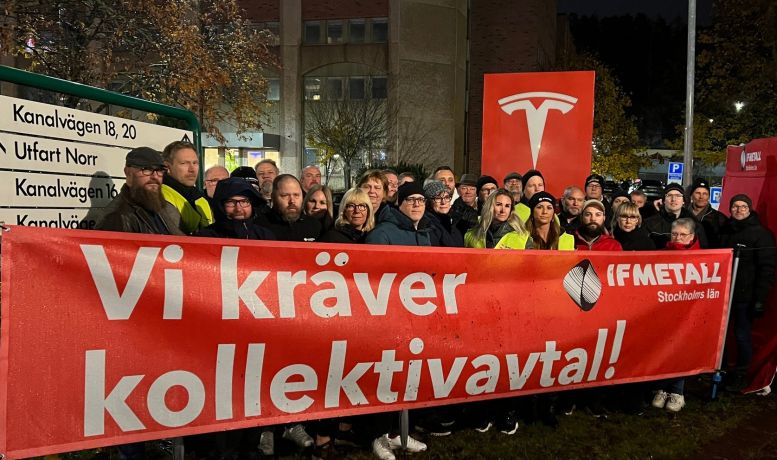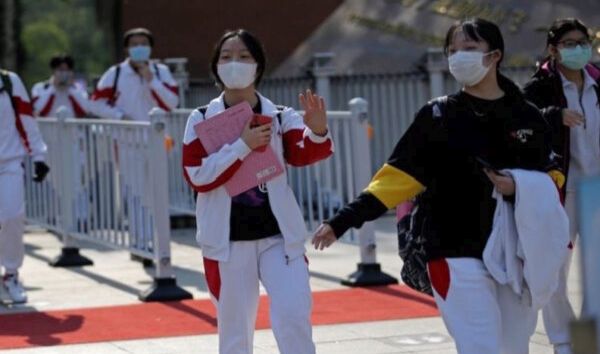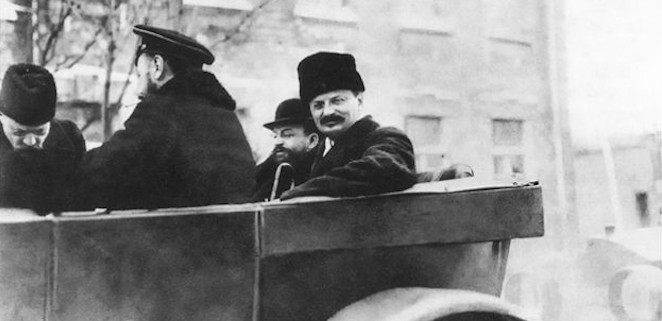Jonas Brännberg is a member of Socialistiskt Alternativ (ISA in Sweden).
After just over a month of strike action at Tesla, the stakes in the dispute have been raised considerably. Predictably, the right and capitalists are trying to use the conflict to further restrict the right to strike. Tesla is going even further — in addition to organizing scabs, they are also trying to use the courts to break up legal solidarity actions. However, the strongest union response — grassroots mobilization of members — is still absent.
Already, a court has forced the Swedish Transport Agency to hand over license plates directly to Tesla (until the court makes a final decision on the issue) instead of sending them by postal service (where they would have been left behind due to the sympathy action of the postal workers in the unions Seko and ST).
Even worse is Tesla’s lawsuit against state postal service company Postnord, who they want to force to deliver letters to Tesla. If this lawsuit goes through, it would be historic: not since the Stripa conflict in 1926 has the state decided to act as a strikebreaker in a labor dispute, and that time it led to the fall of the government.
The stakes are high. If Tesla succeeds in establishing its anti-union culture in Sweden, other large companies are free to follow suit. This opens the door to a race to the bottom, where companies with reasonable conditions are forced out of business by companies where workers have no rights. Unlike other countries, there is no lower limit in the form of legislation for many working conditions in Sweden. For example, without collective agreements there is no limit to how low wages can be.
The dispute is not just about Tesla’s conditions being worse than those in the collective agreement for mechanics, but about a culture where the workers’ collective voice is to be stopped in every way. The fact that Tesla has threatened to withdraw stock option programs and no pay increase for workers who strike shows what it’s all about — conditions and wages are to be determined at the mercy of the company and Elon Musk. The battle also has international effects — if Tesla succeeds, it strengthens their “principle” of not signing collective agreements. If the workers and the union IF Metall wins, it can give a boost to workers in struggle, such as in the US where the UAW has strengthened its chances to organize workers at Tesla after the successful 40-day strike at GM, Ford and Stellantis.
Spearheaded by a deeply anti-union company and the most anti-worker government in modern times, the capitalist establishment is taking the opportunity to attack the right to strike. The CEO of the Confederation of employers organisations Jan-Olof Jacke says that the sympathy measures are “not reasonable” and “not proportionate” while the business organization Almega is more straightforward: “The rules on sympathy actions should be tightened and new rules on proportionality must be introduced. …Should an agreement between the parties still not be possible, the government must proceed with legislation.”
Whether it is incredible naivety or some kind of media strategy, the response so far from the union leadership is weak to say the least. The bargaining secretary of LO (blue collar workers TUC) Torbjörn Johansson told Dagens Arbete that the employer organizations “should stand up for our model. They are simply showing that they are spineless.”. The main union magazine Arbetet’s Martin Klepke rightly points to the historic nature of Tesla’s lawsuit against the state but writes “It is truly preposterous, and shows how little Tesla’s owners understand how democracy and the rules of the labor market work.”
Underestimating your opponent is incredibly risky, just look at Putin’s the invasion of Ukraine. Both the Confederation of employers organisations and Tesla are fully aware of what they are doing — their goal is to weaken collective agreements, severely weaken workers’ positions by trying to restrict the right to sympathy actions and set a new standard where the courts can be used against the trade union movement. They have the right-wing media, a far-right government and billions of dollars behind them.
IF Metall and the trade union movement as a whole still have a great opportunity to win this battle, but to do so they need to speak clearly about the threat from the right and mobilize their members. It is clear that the actions taken so far are not enough to win, although the strike and sympathy actions by at least nine different unions, including dockers and electricians, are very important.
In addition to strikes and sympathy actions, union members need to be mobilized in actions and demonstrations to raise morale and awareness of what is at stake. And with Tesla resorting to organized strikebreaking for the first time in decades, picket lines need to be transformed from symbolic actions with mulled wine and gingerbread to real actions that can prevent strikebreaking. For this to be possible, a real grassroots organization of members and all those sympathetic to the strike must be built. Then not only can one of the richest men in the world be forced to guarantee reasonable conditions for all Tesla’s employees, but the attacks of the right can be repelled and a fighting workers’ movement can be rebuilt, where the strength rests on the activity and awareness of its members.




